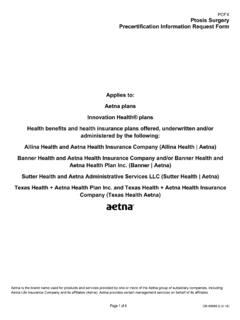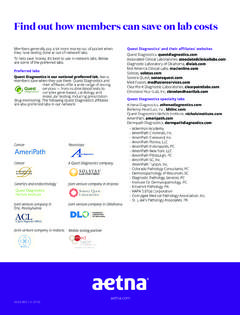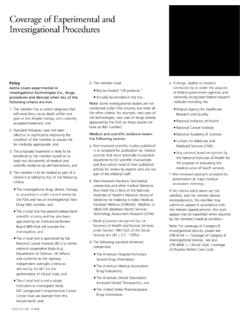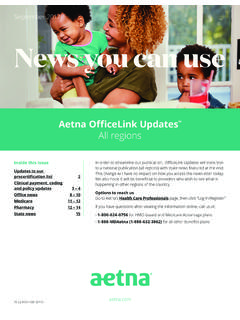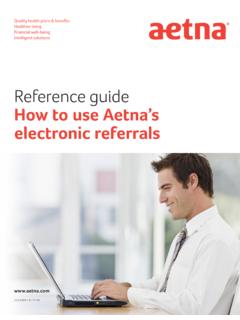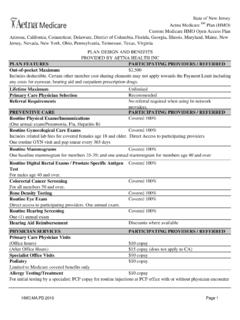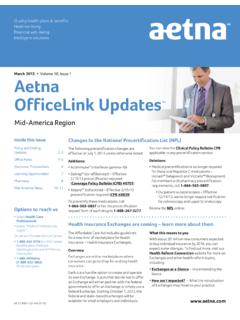Transcription of Dependent coverage Questions and Answers About Health …
1 Questions and Answers About Health Reform November 2010 Overview The Patient Protection and Affordable Care Act (PPACA) requires plans and issuers that offer coverage to children on their parents plan, to make the coverage available until the adult child reaches the age of 26, even if the young adult child no longer lives with his or her parents, is not a Dependent on a parent s tax return, or is no longer a student. The Department of HHS, Labor, and Treasury have issued interim final regulations implementing the new requirement. Dependent coverage When will dependents who would meet the new provision of the federal law be allowed to enroll for coverage ? The law requires that an enrollment opportunity be provided not later than the first day of the first plan year beginning on or after Sept.
2 23, 2010 and continue for at least 30 days. A notice regarding this opportunity must be provided and may be included with other enrollment materials if it is prominent. coverage , if elected, must be effective on the first day of the first plan year on or after Sept. 23, 2010 For most plans, this above requirement will be met through the open enrollment process. On an ongoing basis, enrollment could also occur during a subsequent open enrollment or due to a qualifying event. Questions and Answers : Does this provision impact current plans or just new plans? Does the Dependent coverage requirement apply to all markets? For plan years starting six months after PPACA s enactment ( , Sept. 23, 2010), all plans providing Dependent coverage are required to make that coverage available to adult children both married and unmarried up to age 26.
3 Until 2014, grandfathered group plans are not required to offer coverage to dependents who are eligible for employer coverage other than through their parent. Does the Dependent mandate apply to married children? Both married and unmarried dependents qualify for this Dependent coverage . coverage of the Dependent s spouse or children is not required. Does it apply to grandfathered plans? This provision applies to both new and grandfathered plans. However, for plan years before January 1, 2014, grandfathered group Health plans may exclude an adult child if the adult child is eligible to enroll in an employer-sponsored Health plan other than a group Health plan of a parent. Beginning in 2014, grandfathered group plans must comply with the requirement and children up to age 26 can stay on their parents employer plan even if they have other employer-sponsored coverage available.
4 Do employers have to offer Dependent coverage ? No. PPACA does not require employers to offer Dependent coverage . B (11/10) 2010 aetna Inc. Questions and Answers About Health Reform November 2010 Dependent coverage aetna is the brand name used for products and services provided by one or more of the aetna group of subsidiary companies, including aetna Life Insurance Company and its affiliates ( aetna ). This summary is provided for informational purposes only. This summary should not be construed as, or relied upon, as legal or any other advice. Employers should consult with their own legal counsel for a comprehensive explanation of the rules and the proper application of these rules to their particular situation. Exactly when does coverage cease per dependents? PPACA specifies that the coverage must continue until the Dependent s 26th birthday.
5 aetna will administer by using either: The aetna default (at the end of the month during which the Dependent turns 26), or Any applicable state mandates, or Customer election, if it can be administered (which can include variations such as termination upon the next billing cycle). Whichever rule is the most generous will be applied. Did aetna adopt this new requirement early? For individual policies and small group plans: Beginning on June 1, 2010, well in advance of the Sept. 23, 2010 requirement in the new law, aetna decided to continue coverage up to age 26, for all dependents currently covered on a parent s insured small group or individual medical plan. Any existing plans with Dependent limiting age either at or above age 26 were not impacted by this acceleration of compliance with the mandate.
6 For Insured large group and self-funded plans: aetna decided to allow self-funded plan sponsors and large group fully insured plan sponsors to elect an early adoption of the Dependent age mandate effective on or after June 1, 2010, extending coverage to dependents currently covered under their parents plan until age 26. Approximately 100 customers took advantage of early adoption. If a Dependent is covered by a parent s plan and a spouse s plan, which plan pays first? The NAIC rules for order of benefit determination are applied to determine which of the plans should be the primary payer. B (11/10) 2010 aetna Inc.
